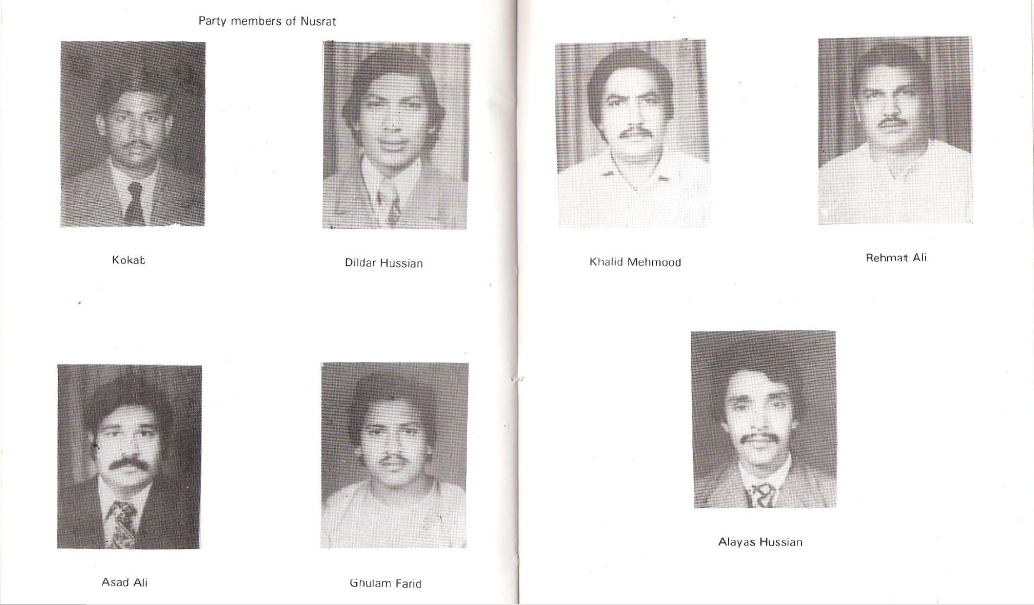The composition of Khan’s ensemble, called a “party” (or “Humnawa” in Urdu), changed over its 26 years. Listed below is a snapshot of the party, circa 1983:
- Mujahid Mubarak Ali Khan: Khan’s first cousin, vocals
- Farrukh Fateh Ali Khan: Khan’s brother, vocals and lead harmonium
- Rehmat Ali: vocals and second harmonium
- Maqsood Hussain: vocals
- Rahat Nusrat Fateh Ali Khan: Khan’s nephew and pupil, vocals
- Dildar Hussain: percussion
- Majawar Abbas: mandolin and guitar/chorus, handclapping
- Mohammed Iqbal Naqvi: secretary of the party, chorus, handclapping
- Asad Ali: chorus, handclapping. Khan’s cousin
- Ghulam Farid: chorus, handclapping
- Kaukab Ali: chorus, handclapping
The one significant member of the party who does not appear on this list is Atta Fareed. For many years, he alternated with Rehmat Ali on vocals and second harmonium. He is easily identifiable in videos since he plays the harmonium left-handed.
[youtubegallery]
https://youtube.com/watch?v=riakgM1bDz8
[/youtubegallery]
This snapshot is non-representative in one respect: harmoniums were usually the only instruments. Only rarely were instruments like mandolin or guitar used.
Farrukh Fateh Ali Khan (Urdu: فرخ فتح علی خان) (December 25, 1952 – September 9, 2003) was a member of a well-known family of Qawwali musicians. He was t
he younger brother of Ustad Nusrat Fateh Ali Khan, the son of Ustad Fateh Ali Khan, the nephew of Ustad Mubarak Ali Khan, and the father of Rahat Nusrat Fateh Ali Khan.[1]
Nusrat Fateh Ali Khan was the leader of the family Qawwali p
arty from 1971 till his death in 1997. Farrukh Fateh Ali Khan was one of only two people who remained members of the party throughout this period. Farrukh played the lead harmonium, and provided accompanying vocals. His talent to play in all scales and his ability to switch a tune at a moment’s notice are arguably the best in his profession. While accompanying Nusrat to England, he became widely known as Harmonium Raj Sahib (King of the Harmonium).
His talents and accomplishments often went unrecognized due to playing in the shadow of Nusrat. In an interview to the Pakistan Television in 1989, Nusrat revealed that very often the tunes of the qawwalis sung by the party were composed by Farrukh.[2] He is credited as such in some of the albums by the group, such as Shahenshah.[3]
He remained a member of the party when his son, Rahat Nusrat Fateh Ali Khan, took over the leadership of the party after Nusrat’s death. Farrukh Fateh Ali Khan died on September 9, 2003.
Rahat Fateh Ali Khan (born 1974) (Urdu: راحت فتح علی خان) is a Pakistani singer, primarily of Qawwali, a devotional music of the Muslim Sufis. He is the nephew of Ustad Nusrat Fateh Ali Khan.[1] In addition to Qawwali, he also performs ghazals and other light music. He is popular as a Bollywood playback singer.[2]
 Rahat was born in 1974 in Faisalabad, Punjab, Pakistan into a family of traditional musicians. The son of Farrukh Fateh Ali Khan, he was trained by his uncle Nusrat Fateh Ali Khan in the art of classical music and Qawwali.
Rahat was born in 1974 in Faisalabad, Punjab, Pakistan into a family of traditional musicians. The son of Farrukh Fateh Ali Khan, he was trained by his uncle Nusrat Fateh Ali Khan in the art of classical music and Qawwali.
Rahat Fateh Ali Khan gave his first public performance at the age of ten or eleven, when he toured the U.K. with his uncle in 1985, and performed solo songs in addition to singing with the Qawwali party. At a concert in Birmingham on July 27, 1985, he performed the solo ghazal, Mukh Tera Sohneya Sharab Nalon Changa Ae. At a concert at the Harrow Leisure Centre in 1985, he performed the solo song, Gin Gin Taare Lang Gaiyaan Rattaan. He debuted as a playback singer with the movie Paap (2004), featuring the hit song, Mann Ki Lagan. His recent works include Pakistani nationalistic songs such as Dharti Dharti and Hum Pakistan, and songs from Bollywood films. He has toured extensively and performed in Pakistan, India, United Kingdom and all around the world. In April 2012 Rahat toured in the UK, performing at Wembley Arena and the Manchester Arena, playing to a combined audience of over 20,000 people.[5]
In a subordinate role with his uncle Nusrat Fateh Ali Khan, working in collaboration with Eddie Vedder, of the American rock band, Pearl Jam, Rahat contributed to the soundtrack of the 1995 Hollywood film, Dead Man Walking. In 2002, he worked on the soundtrack of The Four Feathers in collaboration with the American composer of orchestral and film music, James Horner.[6] In 2002, Rahat guested with The Derek Trucks Band on the song Maki Madni for Trucks’ album, Joyful Noise. In 2011, his vocals were featured on the soundtrack of Mel Gibson‘s Apocalypto.
Courtesy :Wikipedia


where did you get the party’s picture of the members?
I have read somewhere that Ustaad Atta Fareed is still alive and performs. Can you give some lead on this
Here is Atta Fareed saheb’s program link: https://www.youtube.com/watch?v=n9DjIIXgdc8
how did ustd mujahid mubarik ali khan sahab and ustd farrukh fateh ali khan sahab pass away what i mean to ask is that if they had any illness or not